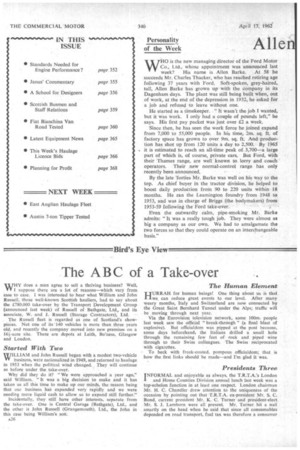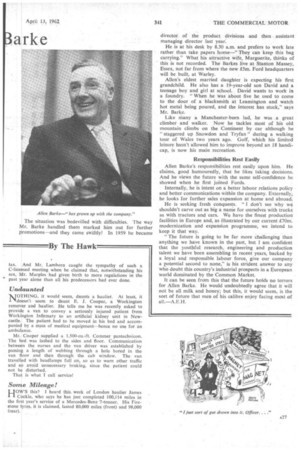And
Page 28

Page 29

If you've noticed an error in this article please click here to report it so we can fix it.
arke
WHO is the new managing director of the Ford Motor Co., Ltd, whose appointment was announced last week? His name is Allen Barke. At 58 he succeeds Mr. Charles Thacker, who has reached retiring age following 37 years with Ford. Soft-spoken, grey-haired, tall, Allen Barke has grown up with the company in its Dagenham days. The plant was still being built when, out of work, at the end of the depression in 1932, he asked for a job and refused to leave without one.
He started as a timekeeper. , "It wasn't the job I wanted, but it was work. I only had a couple of pOunds left," he says. His first pay packet was just over £2 a week.
Since then, he has seen the work force he joined expand from 7,000 to 55,000 people. In his time, 2m. sq. ft. of factory space has grown to over 9m. sq. ft. And production has shot up from 120 units a day to 2,500. By 1965 it is estimated to reach an all-time peak of 3,700—a large part of which is, of course, private cars. But Ford, with their Thames range, are well known to lorry and coach operators. Their new normal-control range has only recently been announced. .
By the late 'forties Mr. Barke was well on his way to the top. As chief buyer in the tractor division, he helped to boost daily production from 90 to 220 units within 18 months. He ran the Leamington foundry from 1948 to 1953, and was in charge of Briggs (the bodymakers) from 1953-59 following the Ford take-over. ., Even the outwardly calm, pipe-smoking Mr. Barks admits: "It was a really tough job. They were almost as big a company as our own. We had to amalgamate the two forces so that they could operate on an interchangeable basis." director of the product divisions and then assistant managing director last year: He is at his desk by 8.30 a.m. and prefers to work late rather than take papers home—" They can keep this bag carrying." What his attractive wife, Marguerite, thinks of this is not recorded. The Barkes live at Stanton Massey, Essex, not far from where the new £5m. Ford headquarters will be built, at Warley.
Allen's eldest married daughter is expecting his first grandchild. He also has a 19-year-old son David and a teenage boy and girl at school David wants to work in a foundry. "When he was about five he used to come to the door of a blacksmith at Leamington and watch hot metal being poured, and the interest has stuck," says Mr. Barke.
Like Many a Manchester-born lad, he was a great climber and walker. Now he tackles most of his old mountain climbs on the Continent by car although he "staggered up Snowdon and Tryfan " during a walking tour of Wales two years ago. Golf, which his limited leisure hasn't allowed him to improve beyond an 18 handicap, is now his main recreation.
Responsibilities Rest Easily Allen Barke's responsibilities rest easily upon him. He claims, good humouredly, that he likes taking decisions. And he views the future with the same self-confidence he showed when he first joined Fords.
Internally, he is intent on a better labour relations policy and better communications within the company. Externally, he looks for further sales expansion at home and abroad.
He is seeking fresh conquests. "1 don't see why we shouldn't carve out as big a name for ourselves with trucks as with tractors and cars. We have the finest production facilities in Europe and, as illustrated by our current 00m. modernization and expansion programme, we intend to keep it that way.
"The future is going to be far more challenging than anything we have known in the past, but I am confident that the youthful research, engineering and production talent we have been assembling in recent years, backed by a loyal and responsible labour force, give our company a potential second to none," is his strident answer to any who doubt this country's industrial prospects in a European world dominated by the Common Market.
It can be seen from this that the future holds no terrors for Allen Barke. He would undoubtedly agree that it will not be all milk and honey; but this, it would seem, is the sort of future that men of his calibre enjoy facing most of al l.—A.E.H.




















































































































